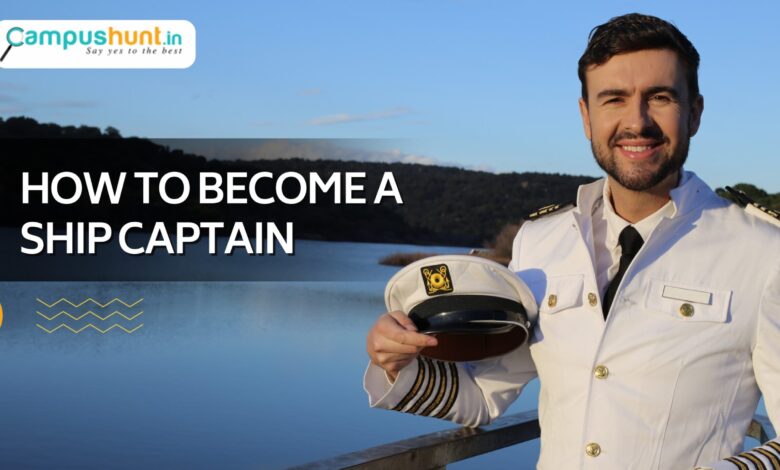How to Become a Ship Captain

At some point in all our lives, who would not want the rush of saying, “I am the captain!”? Well, here is a chance to make that dream a reality. There is nothing like being the Captain of the sea. It is a sense of power, freedom, and responsibility interconnected with the breathtaking view of the ocean. It gives us a sense of leadership and communication, which helps us in both our professional and social circles. The sea is a strong force that reminds you of where you are in the overall scheme of things. As a captain, you get to see beautiful dawns and sunsets, feel the waves spray on your face, and directly witness the pure power of nature.
How to become a ship captain? What exactly should I take up to become one? Will my salary be good enough? These are the few questions in our mind when considering taking up the task of being a ship captain. This article lets us examine how to take the necessary steps to make this a reality. BSc in nautical science, a three-year course; diploma in nautical science, a 1-year course; and G.P. rating, a 6-month course, are a few ways or steps to reach this goal.
This relationship with nature is wonderfully motivating and humbling. A commercial mariner’s salary is always higher than their co-workers working with them on land. Shipping life develops close relationships among crew members. You depend on one another for survival, comfort, and support. Because of this common experience, people develop a special bond and a sense of community with others who appreciate the rewards and difficulties of living at sea.
Courses to take up to become a Captain
B.Sc. Nautical Science
The undergraduate degree program aims to prepare students for maritime sector jobs, specifically as ship officers. A combination of theoretical and practical courses covering navigation, ship operations, meteorology, maritime law, and maritime safety are usually included in the curriculum. The candidates taking this course will eventually become the ship’s Captain. “master mariner” can also refer to the ship’s Captain. After completing this pre-sea training, the candidates can join a ship as nautical Deck Cadets. Leading global shipping companies regularly hold campus interviews to place people in jobs.
Post BSc Nautical Science
After 1 Year of Sea Experience and passing the 2nd Mate Exam, you will be promoted To the 2nd Officer; with further Sea Experience and passing the Chief Mate Exam, you will be promoted from chief Officer to Captain.
Eligibility:
Pass the HSC (Higher Secondary School) or 10+2 with a 60% average in PCM (physics, chemistry, and mathematics) from an accredited board or a Bachelor of Science degree in Physics, Chemistry, Mathematics, or Electronics with a focus on Physics as a separate course of study in one of the years and a minimum of 55% on the Final Year average. Or a BE, B.Tech, or both. English 50% of marks, either in 10th or 12th grade.
Vision:
No color blindness; each eye’s vision is 6/6. Glasses are not allowed.
Age limit:
Twenty-five years is the maximum (30 years for SC/ST candidates and 28 years for 0BC candidates).
Diploma in Nautical Science
A Diploma in Nautical Science is a shorter, more focused program than a full B.Sc. It is designed to provide students with the essential knowledge and skills needed for entry-level positions in the maritime industry, particularly as deck ratings or officer trainees. Since diploma programs typically last shorter than degree programs, they provide a quicker route to employment. Diploma holders in Nautical Science frequently work as deck cadets or in comparable entry-level roles on ships. For those who want to return to school and get more qualifications and experience to advance to a higher-ranking officer position, it can also act as a stepping stone.
Post Diploma in Nautical Science
Following a year-long Diploma in Natural Science program, you must join as a Trainee Cadet, complete an 18-month sea experience program, receive a DLP from the University, and pass the 2nd Mate exam to become a second officer. Get promoted to Chief Officer with additional sea experience and a passing score on the Chief Mate exam. Furthermore, you advance to the position of Captain as you gain more sea experience.
Eligibility:
Pass the HSC or 10+2 with a 60% average in PCM (physics, chemistry, and mathematics) from an accredited board. (or) a Bachelor of Science degree in the subjects Physics, Chemistry, Mathematics, or Electronics with a focus on Physics as a standalone subject in one of the years and a minimum of 55% on the Final Year average. Or a BE, B.Tech, or both. English 50% of marks, either in 10th or 12th grade.
Vision:
No color blindness; each eye’s vision is 6/6. Glasses are not allowed.
Age limit:
Twenty-five years is the maximum (30 years for SC/ST candidates and 28 years for 0BC candidates).
General Purpose (G.P.) Rating:
Rating is a designation in the maritime industry for a specific type of entry-level crew member on ships. G.P. Rating is a job designation rather than an academic qualification. Individuals with a G.P. Ratings are typically responsible for general duties on board a ship and assist in various tasks. The role is considered an entry-level position, and G.P. Ratings work under the supervision of officers and higher-ranking crew members. G.P. Rating can be a starting point for a career in the maritime industry. With additional training, sea time, and certifications, individuals may advance to higher positions, such as deck or engineering officers.
Post General Purpose (G.P.) Rating:
Following a six-month G.P. Rating Course, enlist as an engine or deck crew. After that, you will be promoted to engine or deck side as an AB Seaman Bosum. Following 36 months of sea experience and meeting specific requirements, you can take the 2nd Mate exam. After completing that, you can advance to the rank of second officer and, with additional sea experience and passing an exam, to Captain.
Eligibility:
Pass the eighth grade with a 40% cumulative GPA in English, Math, and Science from a government-approved board. 40% in English in the Xth or XIIth grade (or) in any stream board recognized by the government, totalling 40%. English is 40% in the Xth and XIIth grades, but students take science, math, and English in the Xth grade. Pass the two-year, DVET-approved ITI program with a minimum of 50% overall in the final year and 40% in English in the Xth and XIIth grades.
Vision:
No color blindness; each eye’s vision is 6/6. Glasses are not allowed.
Age limit:
Twenty-five years is the maximum (30 years for SC/ST candidates and 28 years for 0BC candidates).
Top Colleges for Pursuing the Courses Mentioned above
1. International Maritime Academy (IMA)
Established in 1999, the International Maritime Academy (IMA) is a distinguished institution in Chennai, Tamil Nadu. The International Maritime Academy (IMA) provides five different full-time degree programs. The institute offers five distinct undergraduate programs tailored to the needs of learners from different backgrounds. The International Maritime Academy (IMA) is one of the best institutions for higher education to consider. Students can select from programs such as B.E. / B.Tech with Engineering Institute stream, allowing them to specialize in Marine Engineering or Naval Architecture and become proficient in those fields. The International Maritime Academy (IMA) offers courses duly approved by AICTE and other approving bodies.
2. Amet University Chennai
AMET is on the east coast road, overlooking the deep blue sea and cradled by the Bay of Bengal. The University is India’s only group associated with the International Association of Maritime Universities. With a certain quality, commitment, knowledge, and excellence as its cornerstones, AMET began in 1993 with just 14 cadets preparing for a career in the merchant navy through a Higher National Diploma programme in marine engineering. AMET’s firm pursuit of excellence in maritime education and training, combined with its ability to supply the global shipping industry with an unmatched maritime human resource, earned it the distinction of becoming India’s first Deemed to be University for maritime education, training, research, and development activities on August 21, 2007.
3. Vels University Chennai
Dr. Ishari K Ganesh, a visionary and eminent educationist with an M.Com, MBA, B.L., (M.L.) and Ph.D., founded Vel’s Educational Trust in 1992. He established this trust in the loving memory of his beloved father, Shri. Ishari Velan is a former Tamil Nadu government minister. Vels Educational Trust’s core mission is to open new avenues of learning to empower individuals and assist them in becoming self-sufficient. This establishment provides quality education that equips students to deal with quality education. Vels Institute of Science, Technology, as well as Advanced Studies, is the result or end product of 20 years of dedicated efforts to continuously improve and create an environment of all-round growth for students and provide them with the necessary exposure and opportunities to become Industry-Ready on a national and international scale.
4. International Maritime University (IMU)
The Indian Maritime University (IMU) was established as a Central University in November 2008 by an Act of Parliament (Act 22) under the Ministry of Shipping, Government of India. It is a teaching and research university based in Chennai, with regional campuses in Chennai, Mumbai, Kolkata, and Visakhapatnam. It is also affiliated with 18 institutes. The University is a member of the International Association of Maritime Universities (IAMU), which promotes global maritime excellence. IMU offers various Maritime Studies courses leading to U.G., P.G., and PhD degrees in various disciplines. These courses are provided by the School of Maritime Management, the School of Marine Engineering & Technology, the School of Nautical Sciences, and the School of Naval Architecture & Ocean Engineering.
5. Hindustan Institute of Maritime Training (HIMT)
Hindustan Institute of Maritime Training (HIMT): On September 24, 1998, D.G. Shipping approved the formation of HIMT, which then came into existence. India’s largest maritime institute is located in Chennai, Tamil Nadu. It is affiliated to Indian Maritime University and has been approved by the Directorate General of Shipping. The HIMT in Chennai acts as an inspiration for aspiring mariners. It is well-known for providing various maritime courses, from pre-sea training to post-sea courses. The institute has modern facilities, experienced faculty, and training devices to provide students with hands-on learning opportunities. Plus, being in Chennai provides coastal vibes and delicious South Indian cuisine to fuel your maritime adventures.
Careers Available
- Deck Officer: This is the traditional path for graduates of nautical science. You’ll begin as a Deck Cadet, gaining practical sea experience before progressing to Third Officer, Second Officer, Chief Officer, and, eventually, Captain.
- Marine Engineer: In charge of maintaining and operating the ship’s machinery and systems. Specializations for marine engineers include movement, refrigeration, and electrical systems.
- Radio Officer: Maintains and operates the ship’s communication equipment, ensuring safe and dependable communication with shore and other vessels.
- Marine Pilot: Ships are guided into and out of harbors, as well as through treacherous waterways. This position necessitates extensive experience and specialized training.
- Port Operator: Manages a port’s day-to-day operations, such as cargo handling, vessel traffic, and safety.
- Maritime Surveyor: Inspects ships and cargo to ensure safety regulations and international standards are followed.
- Marine Insurance Surveyor: Explores maritime accidents and evaluates damage or loss claims
- Nautical Instructor: Educate future generations of seafarers in maritime academies or training centers.
- Researcher: Conduct research in various maritime areas, such as navigation, safety, and environmental protection.
- Entrepreneur: Create your own maritime company, such as a shipping company, a maritime consulting firm, or a boat repair shop.
Salary
Salaries in the maritime industry vary according to position, experience, and the company for which you work. Deck officers have the highest pay, followed by marine engineers and pilots. They get on an average between 1 LPA for freshers anywhere beyond 24 LPA for experienced depending upon the job role and skills.
Why choose Chennai then?
Chennai has a lot to offer, ‘The gate way of the south’ as it is commonly referred to as holding history and culture in their hands. The bustling streets smell like fresh flowers and yummy food. Chennai is the best place to pursue education particularly in the field of maritime studies:
- Maritime Hub: Chennai is an important maritime hub in India. Because it is so close to the sea, it provides an immersive environment for maritime studies, making it a useful and relevant location.
- Infrastructure of the place: The city has modern infrastructure, such as ports and shipping facilities. This creates a favorable environment for hands-on training and real-world experience.
- Cultural and traditions: Chennai is a thriving city with a diverse cultural heritage. Studying here not only provides you with a high-quality education, but also allows you to immerse yourself in the diverse culture of South India.
- Industry: Chennai’s maritime industry is well-established. Studying here can help you make valuable connections with professionals and potential employers in the field.
- Quality Education: Institutes such as HIMT in Chennai are known for their high educational and training standards. You’ll be learning from experienced faculty and gaining valuable practical skills in the maritime industry.
- Lifestyle in chennai: Chennai provides a comfortable lifestyle that combines urban and coastal living. The city’s lower cost of living in comparison to other metropolitan areas is an added bonus.
So, if you want a well-rounded maritime education with a dash of cultural experience and industry exposure, Chennai could be the ideal port for your academic voyage.
Conclusion
It’s thrilling to be a ship captain. They are in charge of everything on the ship. He or she is ultimately responsible. They are the boss, the manager, the motivator, and everything else in between. A good master inspires and empowers his crew to perform to their full potential. They maintain the hierarchy and have to be a parent figure who is authoritative yet a friend when the situation demands. They have powers but his discretion has to be backed up by logic and regulations.
I think being a captain makes you more humble and aware that running a bunch of humans and a machine, cut off from the normal world, demands a certain discipline and awareness of the world around. Taking up courses in bsc nautical science, diploma in nautical science or GP rating is the first step to becoming the captain. With the vast number of colleges available in chennai it would be so easy to get quality education in a place like chennai is a dream for many. It’s an exciting experience to be on the ship and work with like minded people away from land.
We have finally reached the end of this long article but hopefully all your doubts about How to become a ship captain? What exactly should I take up to become one? Will my salary be good enough? Have come to an end with the right solution. Different masters will have different views, but being out at sea and commanding a vessel gives professional pride and the satisfaction of running a small happy society, on an island.





